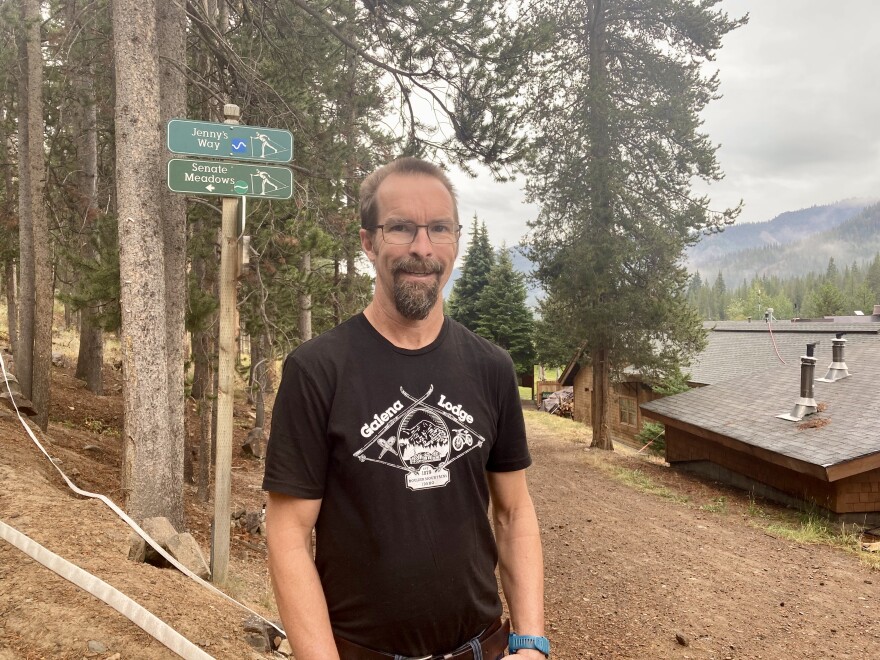Dave Tengesdal and his fiance Suzy Hayes were driving home to Smiley Creek from Stanley the Sunday of Labor Day weekend and planned to have dinner at their neighbor’s. But they turned the corner after Redfish Lake and saw a big plume coming from the Ross Fork Fire.
“We watched a big cloud of smoke from further down the valley and then they sent us a ‘get ready’ evacuation notice,“ he said.
They packed paintings, papers, and dogs into the car. Only about an hour later, they were told to go.
“We watched the fire coming over this mountain ridge over here, just sheets and sheets of fire, and trees torching, and 60-foot high flames coming off of a wall of fire, coming off the corner of that mountain,” said Tengesdal, who's the chief of the volunteer Smiley Creek Rural Fire Protection District.
The last report from the Forest Service had said the fire was four miles away, but now he could see the flames, and guessed there was only a mile between them and houses. It was just a few days after the fire had been quietly burning less than 2,000 acres on the Fairfield Ranger District.

There are just over 20 full-time residents in Smiley Creek — the rest are second homeowners. On this holiday weekend, many of the houses were occupied. Everybody got out safely.
The Smiley Creek firefighters helped secure a water supply, filling tens of thousands of gallons over the days and the Forest Service performed a back-burn Sunday to protect the houses, but winds picked up again Monday and the fire jumped that line.
Two vacation cabins burned, just down the hill from Tengesdal's house, which he protected with hoses alongside four firefighters from Sun Valley, who slept on his porch in case activity picked up overnight.
Zig zags of fire bounced around the sagebrush just beyond his fence, leaving a blanket of barren ground covered in black ash.
“The fire did roll through and, in places, it burned really hot, and just cleaned out a hillside,” Tengesdal said.
The evacuation order for houses in Smiley Creek was downgraded Thursday as rain continues to dampen the Ross Fork Fire, which is now 28% contained.
After more than a week of high-adrenaline days, Tengesdal points out where the fire came into the neighborhood from the Beaver Creek drainage.

Almost everyone who lives in Smiley Creek year-round is a volunteer firefighter. They used to meet once a week, but in fighting the fire, they met three or four times a day. They’ve grown closer, learning each other’s strengths.
“Some people aren’t suited for pulling hoses,” Tengesdal said, “but they made us an incredible meal one night – steak and shrimp. You know, those kinds of things are invaluable.”
Tengesdal has already received five new applications for people wanting to join the volunteer crew.
But the fire has also made it clear they need better training and equipment, Tengesdal said, so they’ve quickly thrown together a fundraising effort.

On Thursday, staff at Galena Lodge, the community-owned recreation hub north of Ketchum, were packing up for the season, as Forest Service employees were cleaning up trees they had limbed the week before to protect the lodge and yurts.
Don Shepler, who runs the lodge with his wife Erin Zell, is also a volunteer firefighter in Smiley Creek. As Shepler was protecting the house in Smiley Creek, Zell was holding down the lodge, which didn’t seem like it was actively threatened until the fire began pushing further into the headwaters of the Salmon River later in the week.
On Sept. 8, the Blaine County Sheriff’s Office issued a pre-evacuation notice for the lodge, and the employees packed up to Hailey for the night.
“Two weeks ago that didn’t even seem like it was a possibility,” Shepler said. “That was pretty intimidating.”
To top it off, that day, two lodge managers on a mountain bike ride noticed a plane circling and, soon after, a helicopter dropping a bucket of water. It was a human-caused start four miles from the lodge, entirely separate from the Ross Fork Fire, and was quickly contained.
Shepler and Zell are stepping down next spring after 16 years of managing Galena Lodge. The Ross Fork Fire forced them to close the lodge early in their last summer season. They lost a few events, including a wedding, and the Boulder Bike Tour, which they had planned to ride together in celebration.
“It’s not the end of the world, obviously, but it is a little sad to go out with a whimper on our last summer,” Shepler said.

Intermittent heavy rain this week has allowed firefighters to increase containment of the Ross Fork Fire. The Forest Service is downsizing air resources, including helicopters, assigned to the fire, and some firefighters are being reassigned to other wildfires. However, the agency warns the potential for dry conditions could return, picking up some fire activity.
Find reporter Rachel Cohen on Twitter @racheld_cohen
Copyright 2022 Boise State Public Radio




